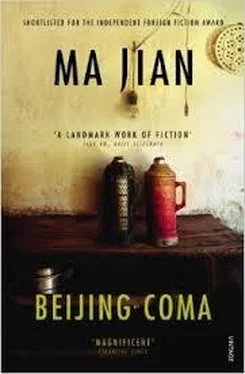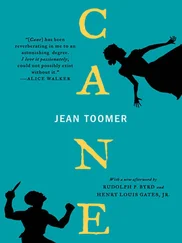It was only when I returned to the room in the evening that it finally dawned on me that she wasn’t coming back, and that everything was over between us. It occurred to me that, if she’d been the one to initiate the separation, then I’d be the jilted lover and, like every jilted lover, I’d feel sad for a while. But if I had broken up with her, then she would be the sad and jilted one. But since I couldn’t work out who had broken up with whom, I knew I’d just have to wait and see what my reaction would be.
That was the first day of our break-up.
Before I went to sleep that night, I read the chapter from The Book of Mountains and Seas called ‘Paths through the Regions between the Seas’. I was fascinated by the descriptions of creatures that were half-human and half-bird: humans with bird faces, and birds with human heads. I wondered whether these were purely mythical creatures, or strange hybrids that had long since mutated or become extinct.
When I finished the chapter, I pulled out my father’s journal again, and flicked through a few pages, but I couldn’t focus on any of the words.
A couple of weeks earlier, I’d looked through some old 1950s editions of Liberation Daily , and found a review of the performance of Beethoven’s Eroica given by the National Opera Company’s orchestra. As I’d expected, there was the photograph of my father holding his violin in one hand and stretching out his other to shake hands with the American conductor. He was wearing a Western suit, and looked young and vibrant. I saw how much I resembled him.
Wu Bin had taken a photo of the newspaper picture, and printed some copies for me. I’d posted one to my mother, and given another to A-Mei. Although I wasn’t a musician myself, I wanted her to know that I was the son of a violinist.
I looked through my photographs of A-Mei, put them away, then took them out again and started noticing details about her that I hadn’t spotted before. In a picture taken during a visit we made to the Guangzhou Friendship Store, she was wearing high-heeled shoes. I’d never realised she owned a pair. Then, in a close-up picture of her face, I noticed fine, downy hairs above her top lip, and a crease in her left eyelid. At three in the morning, I was still pacing around the room, muttering to myself, ‘All right, let’s split up then. You’ll be sorry, though. You’ll come back to me. I know it…’
By midnight, I felt a cold, heavy ache in my heart and had a premonition that it was I who was going to suffer, not her.
I tried to resist falling into despondency. On a piece of paper I listed her faults: ‘Indecisive, inflexible, lazy, weak, sleeps too much, takes too long putting on her clothes and make-up, always hiding from the sun.’ Then, at the bottom, I added, ‘Nothing too serious, I suppose. No one’s perfect.’
This helped me to get through the rest of the night.
The next day I attended lectures as usual, but when I returned to the room in the evening, I could feel her breath emanating from her orange lampshade, her desk, rubber sandals, teacup, nightdress, socks, the menstrual bloodstains on her sheets, the book lying open at the last page she’d read, the tomato she’d left in the mini fridge near the door, the Vaseline Intensive Care shower cream she’d bought for my dry skin. I couldn’t press the electric fan’s start button, because I knew that her fingers had touched it. I preferred to sweat in the still heat. Her breath hung in the room, and with each inhalation, I breathed her in.
With a cold shiver I had to acknowledge that I was the heartbroken one, not her. She was a lake, and I was drowning in her. I was a freshwater fish swept into the salt sea. No — I was a sea fish simmering in an ocean that was becoming hotter and hotter…
Until she left me, I hadn’t realised that love could be so perilous.
Seeds of heartache, buried deep in your flesh, begin to shift into your arteries and veins.
Alcohol and sleeping pills didn’t help me forget her. She was my conjoined twin. I knew that, cut loose from her, I would die.
On the third day after our break-up, my left ribcage began to swell. I became breathless, my throat felt blocked. Only people rejected by the person they love know the true weight of the human heart. I was about to collapse. I heard crashing noises in my head. I stepped out onto the balcony and stared at the blue sky. It was as blue as it had been before she’d left me. But even the blueness seemed to belong to her now. I looked down and felt that I’d never be able to look at the sky again.
I wanted to gouge her out of me. I walked into the streets and circled the campus. When I passed the small restaurant outside the gates, I remembered the dark scar left on A-Mei’s right palm by a door that had closed on her hand when she was a child, and how often I had kissed it, trying to wish away the reminder of that moment of pain. There were some new plastic stools outside the restaurant. Although we’d never sat on them, my heart sank when I saw them. The restaurant manager’s dog and the two stones on the ground reminded me of her too. She hated the dog. She said it had a man’s face.
I tried phoning her home in Hong Kong, but her mother would always pick up and tell me crossly not to bother her daughter again.
Wang Fei had wanted to kill himself after he was dumped by a girl he’d dated for only two months. I’d been going out with A-Mei for a year. I wondered how I’d ever recover.
On the fourth night, I woke in the middle of a dream and scribbled the beginning of a letter to her: ‘… I’m like a bird that has lost a wing. Without your wing to help me, I’ll never be able to fly…’ When I went downstairs to buy some more rice wine, I thought of a maths student who’d committed suicide the previous summer after his girlfriend had dumped him. I knew that if I was to live, I’d have to erase all memory of A-Mei from my mind.
I wondered whether the break-up had been predestined. When I’d seen her off at the train station, I’d glanced around the large hall and said morosely, ‘Here we are at the border again.’ The Hong Kong tourists entering the hall were well dressed, with neat hair and tidy suitcases. They didn’t seem to belong to the same planet as the dishevelled hordes of mainland tourists who were trudging wearily around the hall in their bare feet, with plastic bags over their shoulders.
I wasn’t allowed to go where she was going. The notice above us read HONG KONG AND MACAO COMPATRIOTS ONLY.
‘Don’t be sad,’ she said. ‘I’ve read in the newspapers that Hong Kong will revert to China in 1997. And anyway, there are no borders between you and me.’
‘The Chinese are going to adopt a “one country two systems” policy, so the handover won’t change anything,’ I said fractiously. I always felt distanced from her whenever I saw her off at the station. She could tell that.
‘I’ll think about you every day,’ she said. ‘Don’t forget to bring in my skirt from the balcony when it’s dry. You can hang it up by the mosquito net.’ I could see tears welling in her eyes.
‘Remember to get me some cigarettes in the duty-free shop.’ The money I earned selling them to the street stalls covered most of our living costs. After her previous trip, she’d brought back a camera and two lenses, and I was able to sell them for a thousand yuan, which covered the entire year’s rent for our room.
Each time I tried to forget her, my mind filled with images of her face that were so lifelike, I felt I could touch them. I saw the teeth she revealed only when she smiled and the dimples that appeared when she laughed. I remembered trivial and mundane images, like her empty bottle of shower gel which I threw into the bin after she left, and the trace of her lipstick on a teacup. It had only taken me a few seconds to wash the lipstick off, but I couldn’t wash the image from my mind.
Читать дальше












